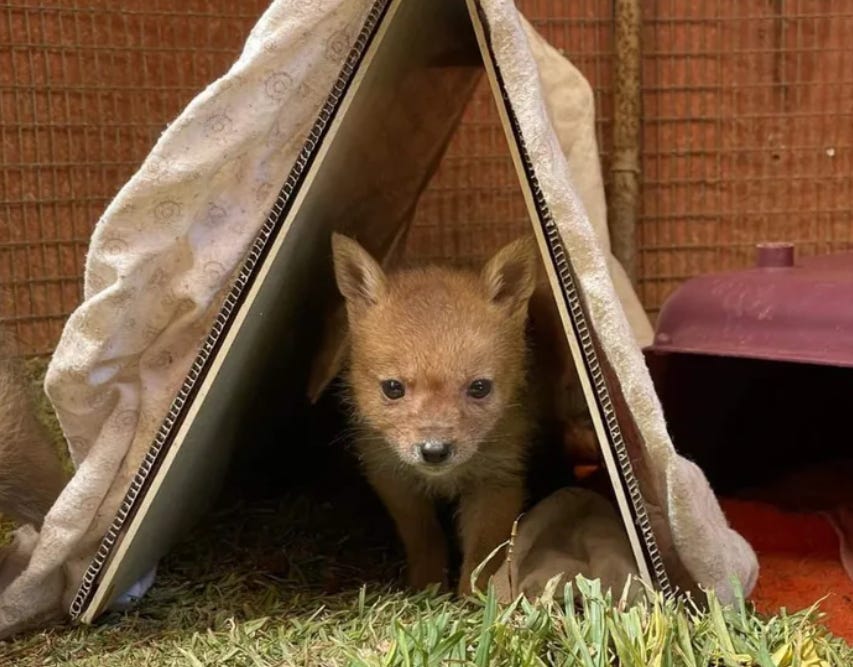Youtuber charged with wildlife offences and jackals saved in South Africa
Plus: some interesting coverage of the links between wildlife trafficking and other serious crimes
It is no secret that wildlife trafficking often intersects with other serious organised crimes. A study published recently reveals the links between the global wildlife trade and organised crime in Canada.
Researchers showed that wildlife trafficking is often connected to other serious crimes, including human trafficking, drugs smuggling and forced labour. Animal parts, including polar bear hides, are even known to have been traded directly for drugs.
The researchers say that their findings illustrate the need to treat wildlife crime in a collaborative, multi-agency way. You can read more of their thoughts in the Conversation.
Another fascinating feature published this week in the Economist 1843 documents how children at a Chinese-run school in Malawi are recruited into the illegal wildlife trade.
The recruitment is linked to Chinese syndicates which smuggle ivory, pangolin scales and rhino horn to China. Such products are popular as status symbols or for medicinal use. The syndicate is also linked to other crimes including corruption and illegal mining.
India: A popular Youtuber has been charged with money laundering in connection with wildlife crime, official sources have said. Elvish Yadav has been accused alongside several others in charges filed close to the Indian capital. He has been accused of generating and possessing the “proceeds of crime” from the monetisation of a 2023 video depicting a protected iguana. (New Indian Express)
Nigeria: Border officers seized 64 donkey skins which were enroute to China via Cameroon. Local officials have warned that the persistent illegal trade in donkey hides could lead the species to extinction in Nigeria. They said that their use in traditional medicines in China has led to an increase in illicit slaughter in the African country. (Sahara Reporters)
South Africa: Five jackal pups were rescued from a wildlife trafficking syndicate in South Africa. The tiny pups were taken to a veterinary hospital in Johannesburg and will be released back into the wild once recovered. (The Post)
Turkiye: Law enforcement in Turkey found 500 red-eared slider turtles packed in luggage aboard a passenger bus on a highway. The reptiles were discovered during a routine traffic stop and were packed into a single bag in the bus’s luggage compartment. The species is native to the US and Mexico. (Turkiye Today)
Europe: Some of the most severe measures taken against climate activists have been in Europe, according to an EU expert. The UK, France, Germany, Italy and Spain have all taken measures to criminalise protest and redefine terrorism laws to prosecute activists, Mary Lawlor, the UN special rapporteur on human rights defenders, said last week. She cited examples of heavier charges for activists in Germany and the UK. (Mongabay)
Mexico: A multi-agency operation freed 13 sea lions which had become trapped in illegally set fishing nets close to San Jorge Island in the Gulf of California. Sea Shepherd, Mexican authorities and other NGOs acted to free the animals. The nets are believed to have been connected to the illegal trade in totoaba, a large type of fish which is fished for its valuable bladder. (Sea Shepherd)
USA: Illegal and unregulated fishing will be tracked using an AI system across the Asia-Pacific region. Planet Labs Federal has been given a US government contract to use its AI systems for vessel detection and monitoring. The company says the technology will “help maintain maritime security around the world”. (Smart Maritime Network)
Thailand: Three Taiwanese nationals were arrested after being found in possession of 52 drugged animals hidden in stockings and wrapped round their bodies at a Bangkok airport. Another Taiwanese was caught two weeks earlier attempting to smuggle slow lorises and tortoises out of the country. Thai authorities believe the cases are linked to a larger Taiwanese wildlife trafficking network. (Khaosod)
Argentina: Nine red-crested cardinals were rescued from traffickers in northern Argentina. Authorities said the birds had been poached, likely to be sold illegally. They will be kept under observation to ascertain whether they are suitable to be released back into the wild. A separate operation in Buenos Aires saw authorities seize two macaws and a toucan from illegal captivity. (Noticias Ambientales)
USA: Authorities have launched a series of operations in Florida as the commercial fishing season has opened. One vessel and crew were hit with a violation for illegally catching stone crabs. Officers first discovered a line of illegally set crab traps in September. (Undercurrent)
Thank you so much for reading Wild Crime. This is a fully reader-supported publication with no outside funding. Paid subscriptions make it possible for us to dig deeper and pursue investigations that take time and resources. But even if you’re reading for free, you’re helping to keep this work alive, and I’m grateful for that.
If you’d like to support Wild Crime further, consider becoming a paid subscriber or sharing this newsletter with someone who might find it interesting. Every bit of support makes a real difference.


